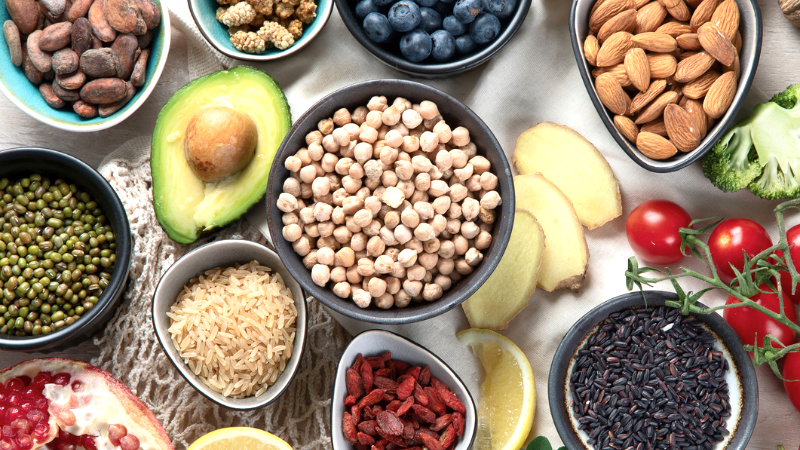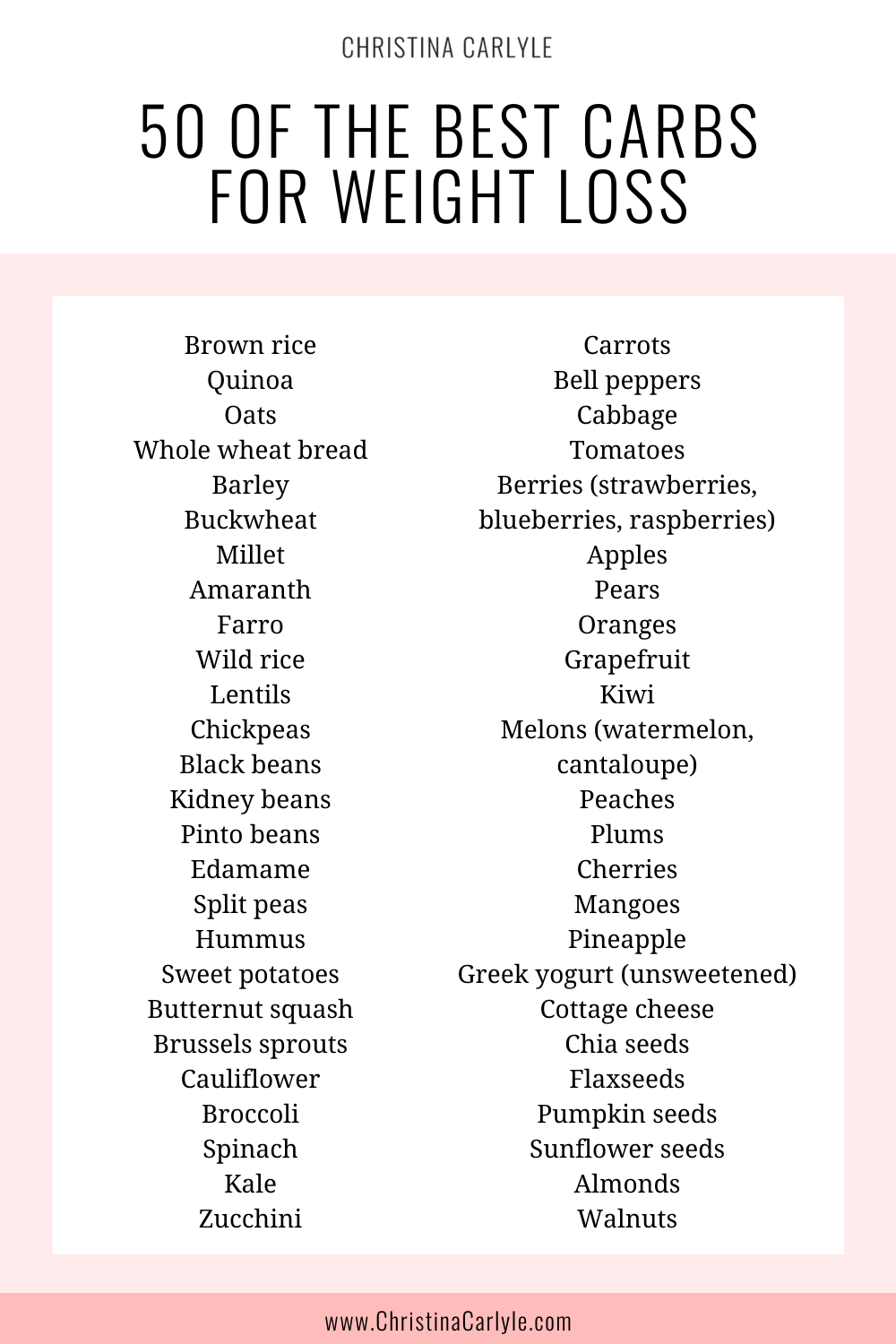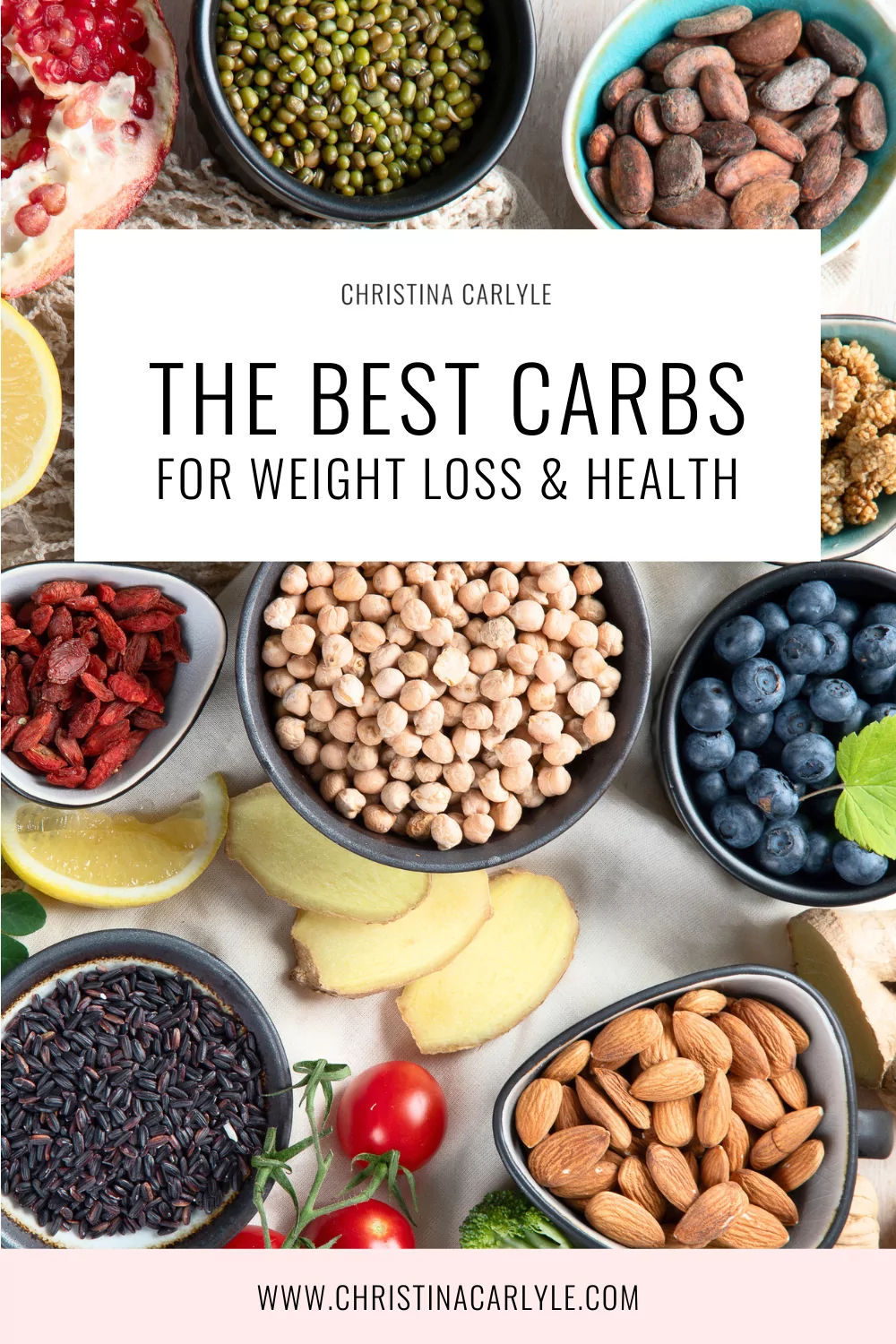Last Updated on August 17, 2023
Just about everyone on a weight loss or health journey comes to me curious about carbs, namely what carbs are best for weight loss… and what carbs are the worst.
That’s what I’ll be addressing in this deep dive because carbs have such a huge impact on weight, health, and metabolism.
I’ll be covering:
How Carbs Affect Weight Loss and Metabolism?
First things first. A lot of people assume carbs cause weight gain and make it harder to lose weight. And this is absolutely true.
Carbohydrates can contribute to weight gain and obesity, and potentially impact metabolism in a few ways:
- Excess Caloric Intake: Consuming more calories than your body needs, regardless of the source (carbohydrates, fats, or protein), can lead to weight gain. Carbohydrates are a source of calories, and if you consistently consume more carbohydrates than your body can use for energy, the excess calories can be stored as fat.
- High GI/Rapid Blood Sugar Spikes and Crashes: Carbohydrates are classified on the glycemic index (GI) based on how quickly they raise blood sugar levels. Foods with a high GI, such as highly refined carbohydrates, such as sugary snacks, pastries, and sugary beverages, can cause rapid spikes in blood sugar levels when consumed. This leads to a surge of energy and a feeling of pleasure. However, this is often followed by a quick drop in blood sugar levels, resulting in a crash which leads to increased hunger and cravings, potentially causing you to consume more calories overall. This crash can also trigger feelings of fatigue, irritability, and cravings for more carbohydrates to regain that energy and pleasure.
- Dopamine Release/Brain Rewiring for Addiction: Carbohydrates, especially those high in sugars, can stimulate the release of dopamine in the brain. Dopamine is a neurotransmitter associated with pleasure and reward. This is why eating sugary foods can feel pleasurable and rewarding, leading to a desire to repeat the experience. Over time, repeated consumption of sugary and highly processed carbohydrates can lead to desensitization of the brain’s reward system. This means that the brain’s response to the same amount of sugar becomes less intense, prompting individuals to consume more in an attempt to achieve the same pleasurable feeling. The cycle of blood sugar spikes, crashes, and dopamine release can create a vicious cycle of cravings. When blood sugar levels drop after a spike, the brain signals the body to seek more sugar to raise those levels again, leading to the consumption of more high-carb, sugary foods. This pattern can be challenging to break.
- Emotional Eating: Carbohydrate-rich comfort foods are often associated with emotional comfort. People may turn to these foods to cope with stress, anxiety, sadness, or boredom. This emotional connection can contribute to the development of habits that involve consuming carb-rich foods even when not physically hungry – often leading to carbohydrate addiction.
- Neurological Adaptation: Some research suggests that high-sugar diets can lead to adaptations in the brain’s reward circuitry similar to those seen in addiction. These changes can make it difficult to control cravings and food intake.
- Insulin Resistance: Consistently consuming a diet high in refined carbohydrates and added sugars can lead to insulin resistance. Insulin is a hormone that helps regulate blood sugar levels by facilitating the uptake of glucose into cells. When cells become resistant to insulin, the body needs to produce more insulin to maintain normal blood sugar levels. This can promote fat storage and hinder the breakdown of stored fat, potentially leading to weight gain.
- Lack of Satiety: Simple and refined carbohydrates that are low in fiber and nutrients do not provide a feeling of fullness and satisfaction, causing you to consume more calories to feel satisfied. So you eat more, but it doesn’t make you feel full. This often contributes to overeating calories and subsequent weight gain.
- Personal Sensitivity: Some individuals may have a genetic or metabolic predisposition or personal sensitivity to carbohydrates, which can lead to easier weight gain when consuming carbohydrate-rich foods. Additionally, individual responses to sugar and carbohydrate consumption can vary based on genetics, activity levels, overall diet, and other factors. Bottom line: different people have different responses to carbohydrates. If you feel like you’re sensitive to carbs or that you can’t lose weight when you eat carbs check out my Metabolic Type Quiz & Weight Loss Training.
- Metabolic Slowdown: Personal metabolic sensitivity paired with prolonged high or low-carbohydrate diets (ketogenic diets) can potentially lead to a temporary metabolic slowdown. This is because the body may adapt to burning fewer calories in response to reduced carbohydrate intake. However, the impact of this slowdown on weight loss and metabolism can vary among individuals. Again this varies according to your Metabolic Type.
It’s important to eat the right kinds so you can get the health and metabolic benefits and avoid the blood sugar spikes and cravings caused by unhealthy sources.
The ‘good’ carbs are complex. The ‘bad’ carbs causing all the problems are simple, processed, or refined… aka stripped of fiber and nutrients to make them more addictive.
Good Carbs for Weight Loss that You Should be Eating
Complex carbohydrates like whole grains, legumes, and vegetables offer more nutrients, fiber, and sustained energy, which can have a positive impact on weight management and metabolism.
The following complex carbs are the best carbs for weight loss. They’re the only carbs containing the nutrients and fibers needed to boost metabolism, regulate hunger, digestion, and aid with weight loss and management.
- Whole Grains: Whole grains are complex carbohydrates that contain the entire grain kernel, including the bran, germ, and endosperm. They are high in dietary fiber, which slows down digestion and helps stabilize blood sugar levels. This prevents rapid spikes and crashes in blood sugar, leading to more consistent energy levels and reduced cravings. The high fiber content also promotes a feeling of fullness, which can prevent overeating. Additionally, whole grains provide essential nutrients such as B vitamins, iron, magnesium, and zinc, which play roles in energy metabolism and overall health. Healthy whole grains like brown rice, quinoa, oats, whole wheat, barley, buckwheat, millet, amaranth, farro, and wild rice provide essential nutrients, fiber, and sustained energy needed to boost metabolism and prevent blood sugar spikes.
- Legumes: Legumes, including beans, lentils, and chickpeas, are rich in both protein and dietary fiber. Protein helps to preserve muscle mass during weight loss and supports the feeling of fullness. The fiber in legumes also contributes to satiety and slows down digestion, helping to regulate blood sugar levels. Moreover, legumes are lower on the glycemic index, which means they have a gentler impact on blood sugar compared to refined carbohydrates. This can help prevent cravings and promote more stable energy levels.
- Vegetables: Non-starchy vegetables are incredibly low in calories and carbohydrates while being packed with vitamins, minerals, and dietary fiber. Fiber-rich vegetables contribute to a feeling of fullness without contributing many calories. The vitamins and minerals they contain are important for various metabolic processes and overall health. Some vegetables, like leafy greens, are also high in antioxidants that support cellular health and may have a positive impact on metabolism. You can see the best vegetables for weight loss here.
- Fruits: Whole, fresh fruits are natural sources of vitamins, minerals, antioxidants, and dietary fiber. While fruits do contain natural sugars, the fiber content helps slow down the absorption of sugars into the bloodstream. This can help prevent rapid spikes in blood sugar and subsequent crashes that can lead to cravings. The fiber in fruits also contributes to a sense of fullness and supports healthy digestion. This article shares the best low-calorie and low gi fruits for weight loss.
- Sweet Potatoes: Sweet potatoes are a nutrient-dense carb source that provides complex carbohydrates, dietary fiber, and various vitamins and minerals. Their lower glycemic index compared to white potatoes means they have a milder impact on blood sugar levels. The fiber content aids in digestion and promotes a feeling of fullness, which can prevent overeating. When you eat sweet potatoes be sure to eat the skin to get the most metabolic benefits.
- Seeds and Nuts: Seeds and nuts are rich in healthy fats, protein, and dietary fiber. The combination of these nutrients helps keep you full and satisfied, reducing the likelihood of overeating. Healthy fats are essential for various bodily functions, including hormone production and metabolism. Just remember that seeds and nuts are calorie-dense, so portion control is important to avoid consuming excess calories. Here I discuss the best nuts for weight loss.
Pin this to Pinterest so you’ll have it forever
Carbs to Avoid Eating for Weight Loss
The “worst” carbs for health and weight loss typically refer to highly processed and refined carbohydrate sources that are often low in nutrients and can lead to rapid spikes in blood sugar levels. These include:
- Sugary Snacks: Highly sugary snacks like candies, cookies, cakes, and pastries are often rich in added sugars, calories, and unhealthy fats, offering little nutritional value.
- Sugary Beverages: Sugary drinks such as sodas, energy drinks, and sweetened juices provide empty calories and contribute to excessive sugar intake.
- White Bread: Refined white bread lacks the fiber and nutrients found in whole wheat bread and can cause rapid spikes in blood sugar levels.
- White Rice: Like white bread, white rice lacks the fiber and nutrients of its whole-grain counterpart (brown rice) and can lead to blood sugar spikes.
- Processed Cereals: Highly processed cereals with added sugars are often low in fiber and can contribute to sugar crashes and cravings later in the day.
- Sweetened Breakfast Pastries: Breakfast pastries like muffins and croissants can be high in added sugars, unhealthy fats, and calories.
- Regular Pasta: Refined pasta lacks the fiber and nutrients of whole wheat or other whole-grain pasta options and can lead to quick spikes in blood sugar levels.
- Packaged Snack Foods: Many packaged snack foods like chips, pretzels, and crackers are often made from refined flours and may contain added sugars, unhealthy fats, and high sodium content.
- Sweetened Yogurts: Flavored yogurts often have added sugars that can contribute to excess calorie intake.
- Fast Food Items: Many fast food items such as burgers, fries, and sugary beverages are high in refined carbs, unhealthy fats, and added sugars.
These types of carbohydrates can lead to energy crashes, overeating, and potential health issues when consumed in excess.
To support health and weight loss goals, it’s generally best to limit or avoid these highly processed and refined carbohydrate sources and instead focus on whole, nutrient-dense options like whole grains, vegetables, fruits, lean proteins, and healthy fats. If you need help with a meal plan I suggest eating for your metabolic type – because if you have too many of the wrong kinds of carbs you can experience stubborn fat, cravings, hormone, digestion, mood, and energy issues.
Remember, If you feel like you’re sensitive to carbs or that you can’t lose weight when you eat carbs check out my Metabolic Type Quiz & Weight Loss Training.
Leave me a comment and let me know the carbs you like when you’re trying to get fit and healthy and which ones you struggle with the most.
xo
Your Coach and Biggest Cheerleader,
![]()
If you liked this article you’ll love everything else in my Best Foods for Weight Loss Series
- Best Healthy Cooking Oils
- Best Protein Powders for Weight Loss
- Best Supplements for Weight Loss
- Best Fruits for Weight Loss
- Best Vegetables for Weight Loss
- Best Nuts for Weight Loss
- Best Milk for Weight Loss






